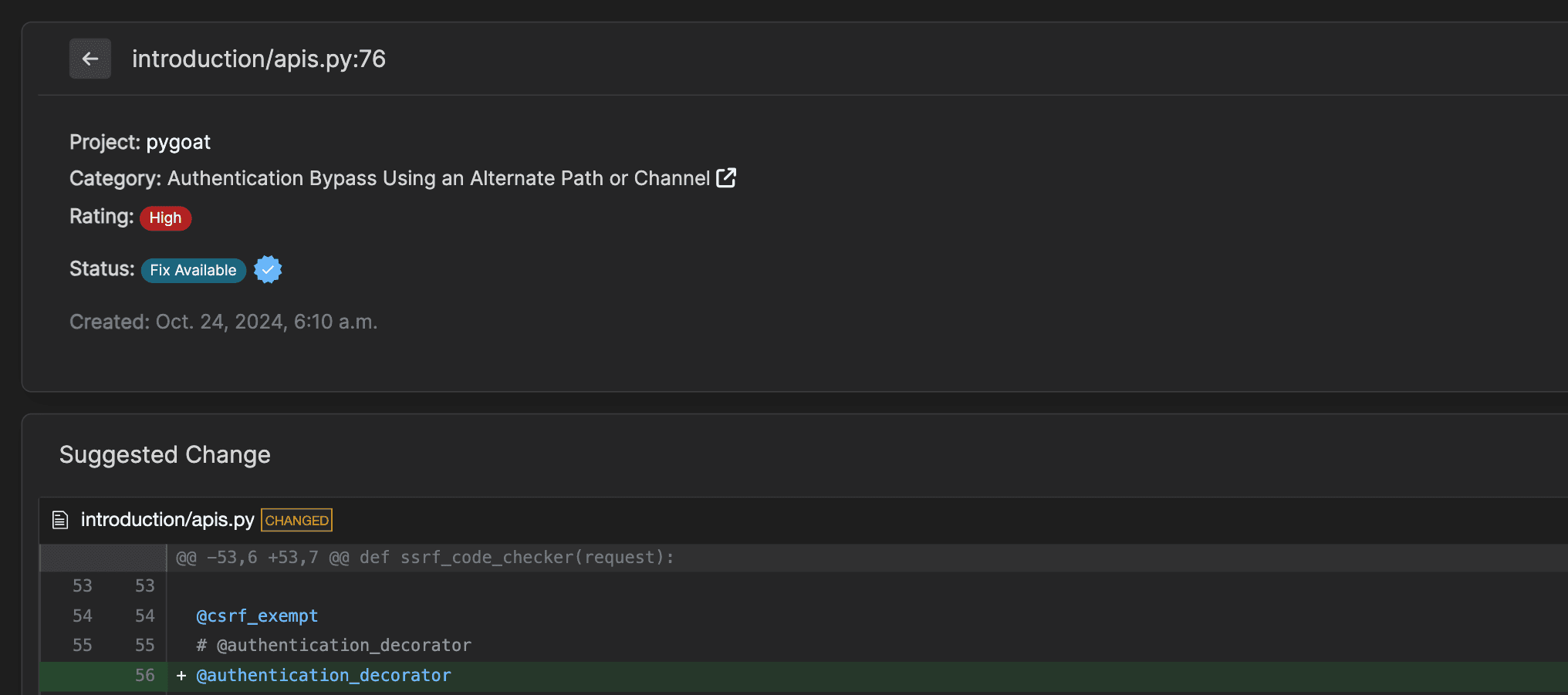Semgrep customers find
real risks when they
switch to Corgea
With security shifting left, picking the right SAST tool is critical. Semgrep is known for its speed and rule-based approach, but Corgea takes it further with next-gen AI—reducing false positives and delivering higher detection accuracy
Feature Comparison

Semgrep
Corgea
SAST Scanning
Static Rules
AI-Native
Business & Code Logic Scanning
X
✔
Broken Auth Scanning
X
✔
Malicious Code Scanning
X
✔
Secrets Scanning
✔
✔
False Positive Rate
>30%
<5%
AI-powered False Positive Detection
✔
✔
Auto-fixes
Unknown Accuracy
+90%
Custom policies in natural language
X
✔
Advanced Blocking Rules
✔
✔
Automated SLA Management
X
✔
Developer Tools (IDE Extensions, CLI)
✔
✔
API Access
✔
✔
Industry’s Lowest
False Positives Rates
Corgea uses LLMs to understand code contextually, catching complex issues like business logic flaws with <5% false positives across 20+ languages.
Semgrep is fast and lightweight but fundamentally pattern-based. It detects common issues quickly but struggles with contextual or multi-file vulnerabilities, often leading to higher false positives on real-world codebases.


AI Powered Policies
Without the Complexity
Corgea lets teams define policies in plain English with PolicyIQ—no custom rule writing needed. Business risk is baked into every scan.
Semgrep requires writing and maintaining YAML rules or custom Semgrep rules. It’s powerful for security engineers but has a learning curve for developers. Enterprise policy frameworks require manual rule authoring.


Auto Fixes
That Actually Work
Corgea integrates into PRs and CI/CD with AI-generated patches and minimal false positives, boosting dev velocity.

S
Semgrep has recently added autofix support, but it’s currently limited to simple pattern-based fixes (like replacing functions or adding missing checks). No contextual business logic fixes or AI-driven patching like Corgea.

Testimonial
This is groundbreaking stuff that everyone should be paying attention to!


James Berthoty
Analyst @ Latio Tech
Semgrep customers find
real risks when they switch to Corgea
As security shifts left, choosing the right SAST matters. Semgrep is well-known—but Corgea brings next-gen AI to the table, cutting false positives and boosting accuracy.
Industry’s Lowest
False Positives Rates
Corgea uses LLMs to understand code contextually, catching complex issues like business logic flaws with <5% false positives across 20+ languages.
Semgrep is fast and lightweight but fundamentally pattern-based. It detects common issues quickly but struggles with contextual or multi-file vulnerabilities, often leading to higher false positives on real-world codebases.


AI Powered Policies
Without the Complexity
Corgea lets teams define policies in plain English with PolicyIQ—no custom rule writing needed. Business risk is baked into every scan.
Semgrep requires writing and maintaining YAML rules or custom Semgrep rules. It’s powerful for security engineers but has a learning curve for developers. Enterprise policy frameworks require manual rule authoring.


Auto Fixes
That Actually Work
Corgea integrates into PRs and CI/CD with AI-generated patches and minimal false positives, boosting dev velocity.
Semgrep has recently added autofix support, but it’s currently limited to simple pattern-based fixes (like replacing functions or adding missing checks). No contextual business logic fixes or AI-driven patching like Corgea.

